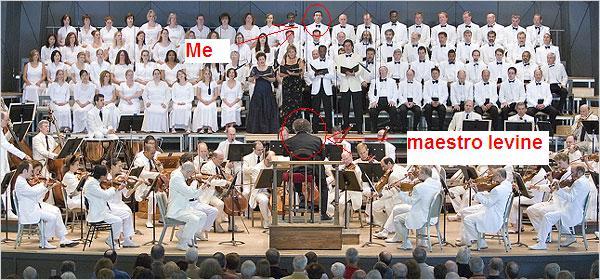It occurs to me that I’ve posted a couple of lists of review links, but haven’t actually written about the experience of performing great choral masterworks at Tanglewood. First a few specific notes about the Mozart performances, then some general observations:
First, the amount of music that the chorus actually sings in Don Giovanni is quite small compared to the three-hour-plus performance length. To be specific, we had three numbers in which we performed: about sixteen or 24 measures each for the men and women in No. 5 (the wedding song), another entrance for the men toward the end of the first act that lasts about 24 or 32 bars, and then the final scene in act II, in which the men have about 16 bars of devilish chorus work. That’s all told less than two minutes of music. Was it worth it to sit on stage for three-plus hours to sing two minutes of music? Um, hell yes, particularly because we had the best seats in the house for the action of the opera. As I eventually agreed with John at MessagesAboutMusic, the key aspect of this opera was being able to watch it, and we had a clear view of all the comedic interactions between the cast. It was a lot of fun.
Second, the Requiem. I’ve sung this piece a few times before, most recently out in Seattle with the Cascadian Chorale on the first 9/11 anniversary, and each performance is different and unique. For one thing, I learned the piece in a non-Süssmayer edition almost 10 years ago with the Cathedral Choral Society, so the memorization part was interesting: I was quite confident with the piece through the first few choral movements but realized a few days before the concert that I was quite shaky on the Offertorium movements, primarily because they had been omitted the first few times I performed the work. But I eventually pulled it together.
This concert was the first time with the TFC that I feel like I really understand why we sing music from memory. Memorizing for a guest conductor can be tricky, since frequently the conductor wants different interpretations of the music from that which was memorized, and there are only a few rehearsals (maybe as few as two) in which to re-learn the music. But singing with Maestro Levine is different.
I observed last year at Tanglewood that his conducting style is different than others with whom I’ve sung. He stopped a rehearsal of Mahler’s 8th and said to the first violin section, “Look at your scores for that passage. I think you’ll see that Mahler wanted something different than what you’re playing.” No histrionics, no micromanaging, just appealing to their native musicianship to bring out a coherent performance.
It appears that he takes a similar approach to working with choruses: if you provide him with a well thought through, passionate performance, he works in that context to provide feedback. But he never microconducts emotional context, dynamics, fugue entrances, etc. because he relies on you as the performer—yes, even the individual chorus member—to bring that to the performance. It’s daunting if you’re used to conductor-tyrants, but it’s liberating and exhilarating if you can own the music and invest your own energy in the performance.
I’ll be interested, after three concerts with Levine in a row, to see how things go with Seiji Ozawa in August. From what I understand it’s a night and day experience.



